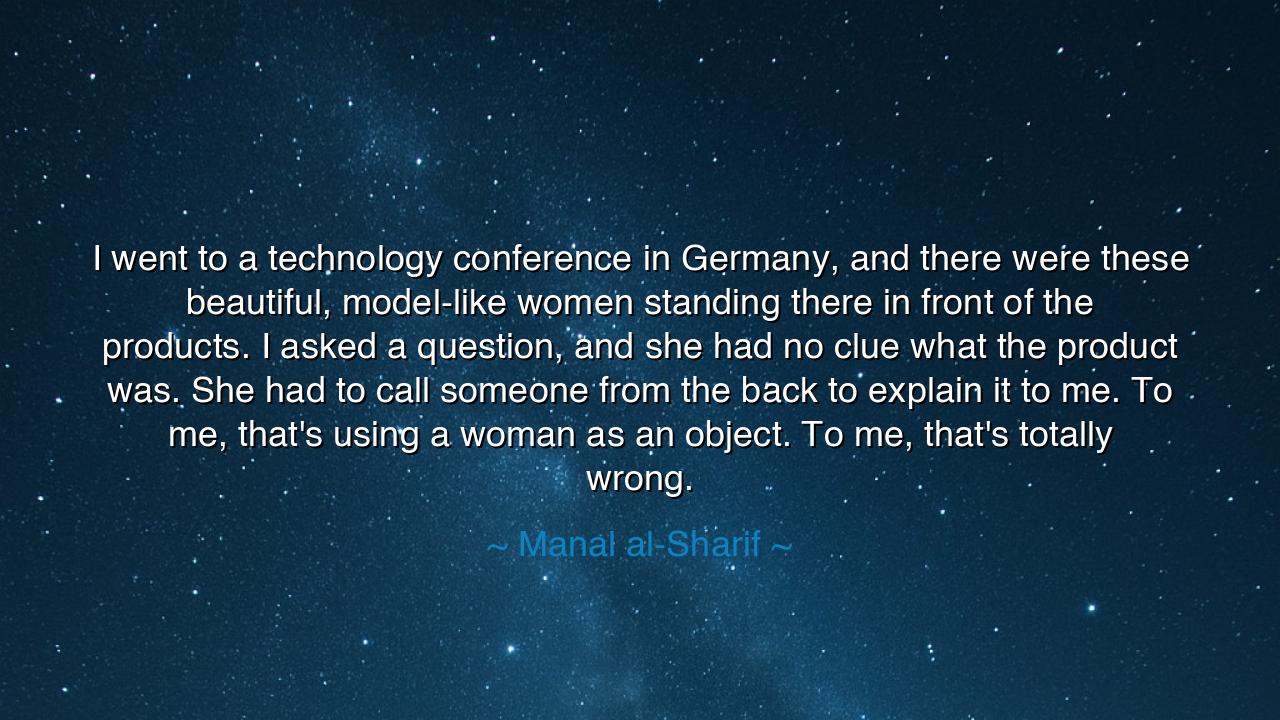
I went to a technology conference in Germany, and there were
I went to a technology conference in Germany, and there were these beautiful, model-like women standing there in front of the products. I asked a question, and she had no clue what the product was. She had to call someone from the back to explain it to me. To me, that's using a woman as an object. To me, that's totally wrong.






Hear, O children of tomorrow, the fiery words of Manal al-Sharif, who bore witness and declared: “I went to a technology conference in Germany, and there were these beautiful, model-like women standing there in front of the products. I asked a question, and she had no clue what the product was. She had to call someone from the back to explain it to me. To me, that’s using a woman as an object. To me, that’s totally wrong.” These words are not the idle musings of a traveler but the cry of a heart that has seen the truth: that the dignity of women cannot be traded for spectacle, nor can the sacred image of humanity be reduced to ornamentation.
The origin of this wisdom lies in the long history of how societies have often chosen to veil truth with appearance. In the days of Rome, gladiators fought in the arena while slaves were adorned as decoration for the pleasure of the powerful. In the courts of kings, women were paraded like jewels to display wealth rather than honored for their voices or wisdom. So too in the modern age, in the glittering halls of technology, where the miracles of science should speak for themselves, women are sometimes placed as adornments—faces without knowledge, bodies without recognition, present not as minds but as masks. This, al-Sharif calls wrong, for it denies the essence of what it means to be human.
Consider, O listeners, the story of Rosalind Franklin, whose work on X-ray crystallography was pivotal in discovering the double helix of DNA. For years, her brilliance was overshadowed, her role diminished, her name nearly erased from the triumph. She was not displayed in the conference halls, but her case shows another face of the same injustice: when women are not valued for their knowledge, truth itself is delayed. In both spectacle and silence, the harm is the same: the objectification of half of humanity.
Al-Sharif’s protest is not only for women, but for humanity as a whole. For when a person is reduced to a surface, when the outer form is prized above the inner spirit, the entire community suffers. The audience learns nothing, the truth of the products is hidden, and the sacred bond between innovation and understanding is broken. To use women as props is to insult not only them, but also the intelligence of the listener and the purpose of the gathering. True progress must be built on authenticity, not illusion.
And yet, the wisdom here is also a call to courage. For al-Sharif, a woman who herself defied unjust restrictions by leading the movement for women to drive in Saudi Arabia, has lived the truth that dignity must be claimed, not begged for. To name the wrong, to call it out in public, is itself a heroic act. Her words echo across generations, saying: “Do not be silent when humanity is diminished. Speak. For silence sustains injustice, but truth breaks its chains.”
The lesson, then, is clear: we must see one another as whole beings, never as ornaments. Let women stand in places of knowledge, let them speak of the tools and ideas they have mastered, let their wisdom shine brighter than their appearance. And for men, too, the lesson is equal: do not be satisfied with facades, but demand substance. In every field—technology, art, politics—let the voice of truth be valued above the display of surface.
Practical actions flow from this teaching. When you encounter injustice, do not avert your eyes. When you see objectification, name it as al-Sharif did. Support the presence of women in positions of knowledge, not decoration. In your own life, value others not for appearance but for their depth. Teach your children that beauty without wisdom is a shell, but wisdom itself is beauty eternal. And in your own walk, resist being reduced to an object—live as a full bearer of dignity, purpose, and mind.
Thus do we honor the words of Manal al-Sharif: that to use a woman as an object is to wound both her and the world, but to honor her knowledge is to uplift humanity itself. Carry this teaching, O children of tomorrow, into the conference halls, into the workplaces, into the homes and schools of your age. For only when truth is honored above spectacle will progress shine like the dawn, and only then will we walk as equals beneath the sun.






AAdministratorAdministrator
Welcome, honored guests. Please leave a comment, we will respond soon